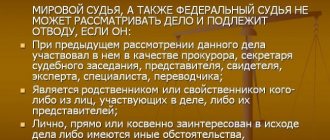The country's basic law prohibits the use of inadmissible evidence in criminal proceedings.
Only legally obtained evidence is accepted and examined by the presiding judge. What evidence is considered inadmissible is regulated by Art. 75 Criminal Procedure Code of the Russian Federation. In court, evidence collected through illegal actions is rejected and not considered, even if it confirms or refutes the guilt of the defendant. Multi-channel free hotline Legal advice on criminal law. Every day from 9.00 to 21.00
Moscow and region: +7 (495) 662-44-36
St. Petersburg: +7 (812) 449-43-40
The concept of evidence in criminal proceedings
Therefore, before presenting evidence to the presiding officer, the prosecution and defense are obliged to make sure that the facts were obtained by legal means and document this. Evidence is data, objects, documents with the help of which the investigating authorities establish whether an unlawful act was committed or not. Using this data, investigators, the prosecutor and the presiding judge determine the guilt of the suspect, and subsequently the accused and the defendant.
The role of such data is important, without them it is impossible to investigate a criminal case. Based on them, the parties prove or disprove the guilt of the defendant. Therefore, it is important to take the collected data seriously and obtain it in a legal way. There should be no violations of current legislation when collecting facts, objects and documents necessary to establish the truth.
Data is divided into two types:
- acceptable;
- unacceptable.
This classification is proposed by the Criminal Procedure Legislation, taking as a basis the principle of legality in criminal proceedings. According to this principle, investigative bodies, investigators, prosecutors, judges, and other officials must strictly follow the norms enshrined in the Constitution of the Russian Federation and the Code of Criminal Procedure of the Russian Federation, without violating them.
Additionally
Information collected by authorized employees, in respect of which challenges may be filed due to circumstances that are essential for the continuation of proceedings, is also considered as inadmissible evidence in criminal proceedings.
Judicial practice proceeds from the fact that the subject composition of legal relations must be appropriate. The recusal of one of the participants in the proceedings can be declared for various reasons.
For example, if a person has an interest in the outcome of the case. In addition, in the event of an unlawful change in the subject composition that could upset the balance in favor of any of the participants, information collected after this is considered as inadmissible evidence.
Definition of Inadmissible Evidence
Inadmissible evidence is data that cannot be used due to its illegality. That is, objects, documents, data and testimony obtained in violation of applicable federal laws.
These facts include:
- documentation;
- objects;
- indications;
- search results;
- results of head-to-head bets;
- audio and video recordings;
- other.
The legislation explains what other data is not accepted by the presiding judge. These will include facts obtained in violation of procedural rules, incorrectly documented, or collected by an investigator who is not involved in the investigation of the case. If the examination was made before the initiation of a criminal case, then the results are not accepted by the presiding officers.
Part 1 art. 75 of the Code of Criminal Procedure of the Russian Federation says that inadmissible evidence has no legal force and cannot be accepted either in favor of the prosecution or in favor of the defense.
Documents are confiscated from the case materials, in particular, protocols drawn up during investigative actions.
The reason for the withdrawal is the deliberate replacement of one document with another:
- replacing the protocol of voluntary extradition with a seizure act;
- replacing the search protocol with a seizure protocol;
- the protocol on checking testimony on the spot was replaced by acts of inspection with the participation of witnesses and other parties to the proceedings or with the results of an investigative experiment.
If such actions are committed, then the investigator and his team are held accountable to the fullest extent of the law.
conclusions
Currently, quite a lot of publications are being published that discuss inadmissible evidence in criminal proceedings (a textbook edited by Kalinovsky and Smirnov, for example). As a rule, they contain special sections devoted to the problem of collecting and attaching information and materials to the case.
In addition, the authors provide quite lengthy lists of possible violations of legal requirements. Typically these lists remain public. As already indicated above, in order to declare evidence inadmissible, the interested person must file a petition. It indicates a request to remove a document or other information carrier from the case materials.
It should be borne in mind that the subject, by sending such a petition, enters into a fight with the prosecution. The burden of proving the legality of the information presented rests with the employee who collected it. At the same time, the position of the objecting subject must also be justified.
In such situations, it is often impossible to do without the help of a qualified lawyer. He will act as a kind of guarantor of compliance with procedural rules, because according to the law, he is one of the subjects authorized to collect and provide evidence in the case.
The winner will ultimately be the one who is able to justify the legality of his actions, referring to specific provisions of regulations.
Types of Inadmissible Evidence
The legislation does not provide a closed list of insignificant data, so in order to understand what is considered insignificant facts and what is not, you need to know their types.
These include:
- evidence obtained illegally or using force or official position;
- testimony of the accused, collected during the investigation in the absence of a defense lawyer, including if the suspect refused a defense lawyer;
- testimony of the accused, which he did not confirm during the trial;
- testimony collected from the injured party, witnesses and other participants in the proceedings, based on conjectures or rumors that do not have any confirmation or obtained from a source that cannot be named;
- a number of other facts obtained by violating the code.
Any evidence is considered inadmissible if it was obtained illegally. But it is necessary to distinguish which data cannot be used due to its illegality, and which data can be used, even if it was obtained by violating the laws.
If a minor witness is involved in the proceedings and questioned without the presence of a teacher, then the presiding judge will not consider his testimony. The law was not violated here, but during the interrogation of the witness, psychological pressure could have been exerted on him. And if this witness was not informed of his rights under the Constitution and the importance of giving truthful testimony was not explained, or the explanation of the rights of the eyewitness was distorted, then such testimony is considered void.
Data cannot be used by the presiding officer if it is collected:
- using psychological influence on the respondent;
- through the use of force and the threat of physical violence against the interviewee and/or his relatives;
- in ways that do not allow the respondent to adequately and soberly assess what is happening and control his actions;
- by misleading a party as to his or her constitutional rights when testifying.
An official does not have the right to use methods that infringe on the freedom and rights of an individual, and harm his mental and/or physical health when collecting the information he needs.
Results of violations
What are the consequences of declaring evidence inadmissible in a criminal trial? As stated above, materials and information collected in violation of the rules lose their legal force. This, in turn, entails the exclusion of inadmissible evidence.
In criminal proceedings, subjects taking part in it have the right to appeal the actions/inactions and decisions of authorized employees, including those related to the inclusion of materials collected illegally.
It seems that it is also possible to challenge the refusal to satisfy a request (petition) to obtain information directly related to the proceedings.
Criteria for recognizing the evidence under investigation as inadmissible in criminal proceedings
To recognize testimony as incompetent, facts are needed to confirm this.
Such evidence is documents registering the beginning of operational actions before the initiation of a criminal case. Evidence is considered insignificant if:
- it was received by an entity that is not authorized to collect facts and has violated the laws on jurisdiction and jurisdiction. That is, the actions of the subject are not supported and permitted by documents. Permission to conduct operational actions is provided by the investigator and/or prosecutor;
- it was obtained from a source that is not named or not specified in the Code of Criminal Procedure;
- to obtain data, operational activities were carried out in violation of legal norms;
- No investigative actions were taken to collect the facts.
If an examination of the clothing of the alleged culprit of the incident is carried out, although there are no permitting documents for this, then its results are considered insignificant. The legislator clearly states this in federal laws.
The investigator’s task at the stage of collecting information and data is to ensure that all actions of him and his team are carried out without violating the law. Otherwise, everything that is received will not be accepted by the court.
Persons entitled to collect data
The legislation established a closed list of persons entitled to receive data for the case under investigation.
These individuals include:
- interrogator;
- investigator;
- prosecutor;
- defender;
- court.
Other persons, according to the law, are recognized as improper subjects and do not have the right to search for data. Otherwise, the information received is not included in the case and is not presented in court.
There are precedents recorded in judicial practice when an unauthorized person collected evidence. The presiding officer rejected such data as obtained illegally. If they are received from any party by an official using his position and using threats to the personally interrogated party or his relatives and friends, then such data is also considered void.
Persons who abuse their position during the investigation are subject to punishment according to the Criminal Code.
Sources related to inappropriate
Data during the investigation is collected from various sources, which are:
- a person against whom a criminal case is being initiated;
- a person whose rights have been violated or harm to health or property has been caused;
- a person who acts as a witness in a case under investigation.
A priori, these sources are reliable unless proven otherwise. During the investigation, it may become clear that the information received from the source cannot be used in further investigation, since the source was found to be inappropriate.
Such sources include:
- persons who are not responsible for their words and actions due to a mental disorder or physical characteristics of the body;
- a person who refuses to name his informant;
- information received from minors and minor witnesses in the absence of a teacher or legal representative;
- the interrogated person was not warned about his refusal to testify against his family and friends;
- a person who was initially involved in the case as a suspect, and later interrogated as a witness;
- a citizen whose identity has not been verified.
Even if these sources contain important information that helps solve the case, their information has no legal force in court. The legislator classifies as improper sources documents certified by a notary, but not recorded in the investigation protocol.
The prosecution and defense should not rely on information received from the above persons. A defense or prosecution based on these facts will not be accepted by the court.
The presiding officer may not accept the results obtained during his research if the expert:
- incompetent in the issue under study;
- added his opinion to the results;
- the expert was not informed that responsibility for drawing up a false act would apply;
- participated in the case in the early stages as a consultant and has his own interest in the outcome of the case.
Even if the expert’s opinion is decisive in court, but it is drawn up in violation of the established rules, then this opinion is rejected and is not subject to consideration.
Remediable and rebuttable violations
They are actions whose results can be corrected. If it is established that non-compliance with the procedure led to a real violation of the adversarial principle, the information and materials obtained during it must be considered legally void.
Accordingly, the actions taken are irreversible. These, for example, include obtaining testimony from a witness with the use of violent actions, torture, and cruel treatment that degrades his dignity and honor.
Such actions do not meet the requirements of fairness and equality of parties. However, not all violations, including fatal ones, committed during production are considered significant when obtaining evidence.
For example, the presence of persons under 16 years of age at a hearing is considered as non-compliance with legal requirements. Moreover, this violation does not matter for the procedure for obtaining information necessary for production.







